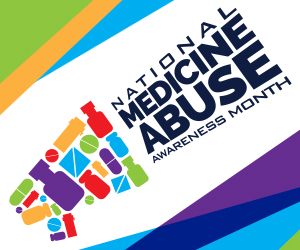October is National Medicine Abuse Awareness Month
 Parents and adult caregivers need to be educated about this problem, as well as their role in preventing it.
Parents and adult caregivers need to be educated about this problem, as well as their role in preventing it.
Below are important things to consider.
- Watch for behavioral and physical symptoms of abuse by youth.
- Irritability, skipping school/work/clubs or activities, communication withdrawal from adults and peers, weight loss, dialated pupils.
- Click here for more information about signs and symptoms of medication misuse.
- Check for signs of Rx medications that do not belong in their teens’ rooms.
- Prescription bottles with no labels, loose pills, pills in a plastic bag, pills that are assorted sizes/colors/shapes.
- Talk with other parents and share information.
- Talk with their teens and grandchildren to dispel the belief that Rx drugs can be safely abused.
- Safeguard your medications.
- Lock up your meds.
- Keep track of medication quantities.
- Properly dispose of medications if they are no longer needed.
Talking points for parents and adult caregivers when talking to youth about substance use
Preschool to Age 7
Before you get nervous about talking to young kids, take heart. You’ve probably already laid the groundwork for a discussion. For instance, whenever you give a fever medicine or an antibiotic to your child, you can discuss why and when these medicines should be given. This is also a time when your child is likely to pay attention to your behavior and guidance.
Take advantage of “teachable moments” now. If you see a character in a movie or on TV with a cigarette, talk about smoking, nicotine addiction, and what smoking does to a person’s body. This can lead into a discussion about other drugs and how they could cause harm.
Keep the tone of these discussions calm and use terms that your child can understand. Be specific about the effects of the drugs: how they make a person feel, the risk of overdose, and the other long-term damage they can cause. To give your kids these facts, you might have to do a little research.

Ages 8 to 12
As your kids grow older, you can begin talks with them by asking them what they think about drugs. By asking the questions in a nonjudgmental, open-ended way, you’re more likely to get an honest response.
Remember to show your kids that you’re listening and really paying attention to their concerns and questions.
Kids this age usually are still willing to talk openly to their parents about touchy subjects. Starting a dialogue now helps keep the door open as kids get older and are less inclined to share their thoughts and feelings.
Even if your questions don’t immediately result in a discussion, you’ll get your kids thinking about the issue. Show them that you’re willing to discuss the topic and hear what they have to say. Then, they might be more willing to come to you for help in the future.
News, such as steroid use in professional sports, can be springboards for casual conversations about current events. Use these discussions to give your kids information about the risks of drugs.

Ages 13 to 17
Kids this age are likely to know other kids who use alcohol or drugs, and to have friends who drive. Many are still willing to express their thoughts or concerns with parents about it. They may ask you more specific questions about drugs.
Use these conversations not only to understand your child’s thoughts and feelings, but also to talk about the dangers of driving under the influence of drugs or alcohol. Talk about the legal issues — jail time and fines — and the possibility that they or someone else might be killed or seriously injured.
Consider making a written or verbal contract on the rules about going out or using the car. You can promise to pick your kids up at any time (even 2 a.m.!), no questions asked, if they call you when the person responsible for driving has been drinking or using drugs.
The contract also can detail other situations: For example, if you find out that someone drank or used drugs in your car while your son or daughter was behind the wheel, you may want to suspend driving privileges for 6 months. By discussing all of this with your kids from the start, you eliminate surprises and make your expectations clear.


